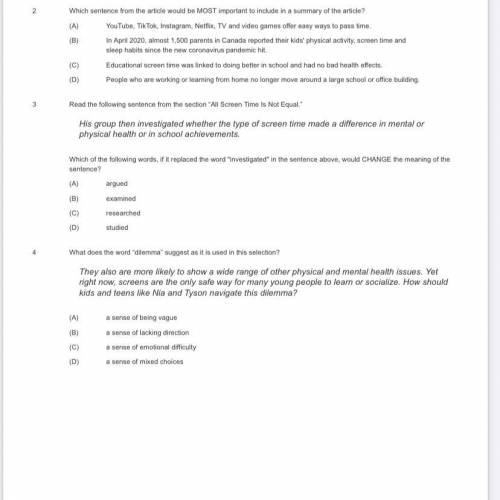Please help it’s due today !
...

Answers: 2


Other questions on the subject: English

English, 21.06.2019 23:00, flore9584
Read this excerpt from "the light of gandhi's lamp" by hilary kromberg inglis, in which she describes driving to the police station where her sister is being detained. to avoid looking at the blackened windows at the top of the building and thinking about the history of who had died or been tortured there, i always looked instead at the little chinese restaurant on the opposite side of the road. how does this passage affect the text? it conveys, with great subtlety, the conflict she felt over having a sister who would break the law and end up in the custody of the police. it conveys, without any implied moral judgment, that those who fought against apartheid considered themselves to be soldiers in a just war. it conveys, with an extended metaphor, the idea that being detained by the police in this society was regarded as a badge of honor. it conveys, with direct language, the view held by many anti-apartheid activists that the police often acted in brutal and unlawful ways.
Answers: 2

English, 21.06.2019 23:30, achaney6733
Why college athletes should not get paid to play state the claim a. point a b. direct quotation to support point a c. point b d direct quotation to support point b
Answers: 1

English, 22.06.2019 04:50, ilawil6545
Read the passage, then answer the question that follows. no one could have seen it at the time, but the invention of beet sugar was not just a challenge to cane. it was a hint—just a glimpse, like a twist that comes about two thirds of the way through a movie—that the end of the age of sugar was in sight. for beet sugar showed that in order to create that perfect sweetness you did not need slaves, you did not need plantations, in fact you did not even need cane. beet sugar was a foreshadowing of what we have today: the age of science, in which sweetness is a product of chemistry, not whips. in 1854 only 11 percent of world sugar production came from beets. by 1899 the percentage had risen to about 65 percent. and beet sugar was just the first challenge to cane. by 1879 chemists discovered saccharine—a laboratory-created substance that is several hundred times sweeter than natural sugar. today the sweeteners used in the foods you eat may come from corn (high-fructose corn syrup), from fruit (fructose), or directly from the lab (for example, aspartame, invented in 1965, or sucralose—splenda—created in 1976). brazil is the land that imported more africans than any other to work on sugar plantations, and in brazil the soil is still perfect for sugar. cane grows in brazil today, but not always for sugar. instead, cane is often used to create ethanol, much as corn farmers in america now convert their harvest into fuel. –sugar changed the world, marc aronson and marina budhos how does this passage support the claim that sugar was tied to the struggle for freedom? it shows that the invention of beet sugar created competition for cane sugar. it shows that technology had a role in changing how we sweeten our foods. it shows that the beet sugar trade provided jobs for formerly enslaved workers. it shows that sweeteners did not need to be the product of sugar plantations and slavery.
Answers: 1

English, 22.06.2019 06:30, miami158999
He united states can produce 200 pillows in one week, while spain and france produce 150 and 100 pillows, respectively, in one week. on the other hand, spain can produce 10 televisions in one week, while the united states and france produce only 5 and 4 televisions, respectively. has an absolute advantage in producing pillows, and has an absolute advantage in producing televisions.
Answers: 2
You know the right answer?
Questions in other subjects:














